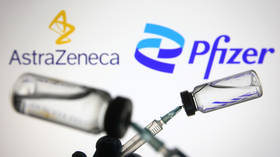EU health agencies advise on how to achieve ‘good levels’ of antibodies

EU health authorities have recommended a “mix-and-match” approach to Covid-19 vaccination, saying that using different jabs during the initial and booster inoculation phases produces “good levels of antibodies.”
In a joint statement, the European Medicines Agency (EMA) and the European Centre for Disease Prevention and Control (ECDC) said that “the combination of viral vector vaccines and mRNA vaccines produces good levels of antibodies against the COVID-19 virus (SARS-CoV-2) and a higher T-cell response than using the same vaccine (homologous vaccination) whether in a primary or booster regimen.”
Using different Covid shots as booster jabs – described by the agencies as a “heterologous vaccination” approach – could be utilized as another means of improving immunity, and might be particularly helpful in providing countries with more flexibility in their inoculation rollouts.
Booster doses can be safely administered as early as three months from the second dose of a vaccine, though ideally this period should be extended to six months, the EMA and ECDC added.
The new recommendations mean EU countries can push on with their own mixed vaccination campaigns without waiting for formal approval from EU authorities. The EMA/ECDC update comes as the new Omicron variant is spreading rapidly across the region.
Research by the health agencies on this issue to date, however, covers only the four vaccines currently authorized by the EU Commission: AstraZeneca, Pfizer-BioNTech, Moderna, and the single-shot Johnson & Johnson.
The agencies also noted that the use of a viral vector vaccine (such as AstraZeneca) as a second shot or use of two different mRNA vaccines “is less well studied.” Additional research is also needed to understand how a heterologous approach affects immunosuppressed individuals and patients with serious chronic conditions.
While the US and UK have already adopted “mix-and-match” booster vaccination, the World Health Organization is still assessing the approach.















